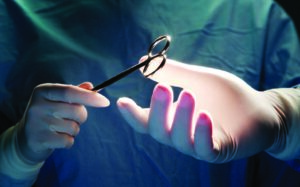As the battle against COVID-19 continues, especially where we practice in Florida, it’s crucial that we continue to implement preventative safety measures in our practice. We wanted to share the lessons that the head and neck surgical oncology team at Baptist MD Anderson Cancer Center in Jacksonville, Fla., learned last year as COVID-19 developed into a global pandemic.
Explore This Issue
November 2021Beginning in March 2020, we implemented a four-month retrospective study analyzing the effects of a series of precautions and practice changes on our ability to deliver high-volume patient care while mitigating virus spread to both patients and team members. We knew it was critical to continue treating head and neck cancer patients during the pandemic.
Here’s what we learned: During the study period, our three-surgeon team performed a total of 812 patient procedures, including 180 new cancer diagnoses. Two hundred seventy-seven in-clinic procedures were performed, and 141 patients required surgery. Admissions resulted in a cumulative length of stay of 462 patient days. Through the course of the study, none of the surgeons, advanced practice providers, or staff acquired COVID-19.
Only a single patient who was COVID-19 positive was taken to the operating room. This patient had advanced oropharyngeal carcinoma and developed spontaneous bleeding from his tonsil. He was diagnosed with COVID-19 upon admission to the emergency department, and the decision was made to proceed given his profuse bleeding refractory to conservative measures.
Patients were screened three times: over the phone a day prior to their visit, upon entry to the cancer center, and upon triage in the clinic.
With the pandemic persisting, special consideration must be given to the safe implementation and/or continuation of critical clinical activities, particularly as it relates to head and neck cancer care. Considering that the SARS-CoV-2 virus is noted to have an elevated presence in the upper airway, with highest levels in the sinonasal tract, aerosol-generating procedures pose an increased occupational risk.
Given our success, we would like to share our precautions in the hope that these measures will be especially beneficial for reducing risk to other otolaryngology practices, as routine practice includes high-risk activities, such as aerosol-generating procedures (endotracheal intubation, tracheotomy, flexible and rigid endoscopy) and use of energy devices during manipulation of high viral load tissues, including the mucosal surfaces of the upper aerodigestive tract.
Multi-Tiered Screening Protocol
The team determined the urgency of new patient referrals on a case-by-case basis, and elective referrals were delayed. Patients were screened three times: over the phone a day prior to their visit, upon entry to the cancer center, and upon triage in the clinic. Pre-visit screening allowed the clinic team to refer patients who were high risk or potentially infected to appropriate care and/or quarantining and testing. The screening questions were developed based on CDC guidance recommendations and were also used to screen asymptomatic virus carriers with queries regarding loss of taste and smell.
